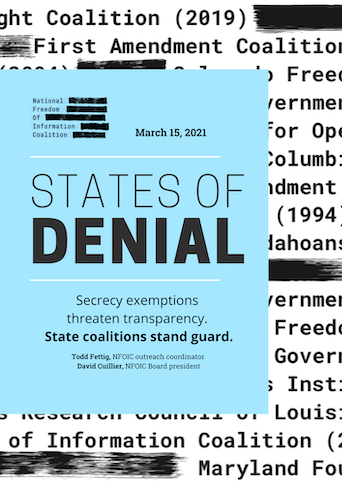Lax enforcement, high fees, hostility also erode ‘sunshine laws,’ public’s right to know
Contact: David Cuillier, NFOIC Board president
Phone: 520-248-6242 Email: nfoic@nfoic.org
GAINESVILLE, FLORIDA, March 15, 2021 — The greatest threats to government transparency today are continued secrecy provisions added to state public record laws, particularly exemptions intended to protect personal privacy and police information. That’s according to open government advocates affiliated with the National Freedom of Information Coalition.
Other threats to transparency include the lack of adequate enforcement for agencies that violate open records laws, general hostility by government officials toward the laws, and exorbitant fees that prevent average citizens from accessing the records they are entitled to.
The threats were identified in a survey of 39 state and local open government coalitions during the first week of March. The survey, administered by the National Freedom of Information Coalition, asked state and local groups, “What are the three greatest threats, in order, to transparency in your state?”
 The coalitions identified these eight most common threats to government transparency:
The coalitions identified these eight most common threats to government transparency:
- Exemptions
- Lack of enforcement
- Officials hostile toward FOI
- Fees too high
- Legislature hostile to FOI
- Public apathy
- Pandemic-related secrecy
- Partisan politics
“There have been several recent legislative attempts to crack down on access to people’s names and contact information, particularly email addresses and cell phone numbers,” said Megan Rhyne, of the Virginia Coalition for Open Government and vice president of the NFOIC. “The stated concern has been privacy, but it’s not privacy in the legal, constitutional sense. Instead, there’s a desire to be anonymous or to be left alone, even though someone
is interacting with the government.”
With more privacy exemptions closing the books on formerly open records, journalists and the general public face increased challenges in watching over the work of state and local governments, and in holding public officials and employees accountable.
“The result is that it’s almost impossible to identify people,” said Susan Schwartz, of the Pennsylvania Freedom of Information Coalition. “So, if you have someone arrested for, say, child molestation, and you’re trying to see if that’s a teacher who has the same name, there’s no way to match the record to the person. Likewise, got a drunk driver who happens to have the same name as your state senator? Good luck confirming whether they’re one and the same.”
More details of the threats to transparency and the work of the National Freedom of Information Coalition members may be found in the newly published “States of Denial” report, available for download here.
The National Freedom of Information Coalition is a national 501(c)3 nonprofit, nonpartisan organization of state and regional affiliates representing most states, the District of Columbia, Puerto Rico and Guam. Through its programs, services and national member network, NFOIC promotes press freedom, legislative and administrative reforms and litigation to ensure open, transparent and accessible state and local governments and public institutions.
